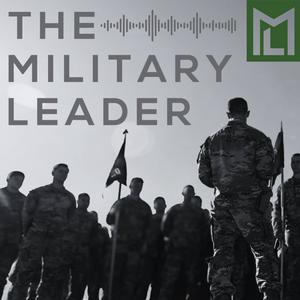23 episodes
- In this episode of The Military Leader Podcast, I sit down with Cal Walters—Army Ranger, JAG officer, professor of leadership, and host of The Intentional Leader Podcast, ranked in the top 1.5% of shows worldwide.
We dive into Cal's journey from long commutes and solo reflection to launching a global leadership platform. You'll hear how a desire to grow (and a nudge from his wife) led to a podcast that’s now shaped over 125 conversations with leaders across the military, business, and academic worlds.
We cover:
✅ Why self-leadership is the foundation of leading others
✅ How to start something meaningful—even if fear is holding you back
✅ Building a leadership brand without letting ego get in the way
✅ What Cal learned from interviewing General McChrystal, General Petraeus, and Patrick Lencioni
✅ The role of military prosecutors and the emotional weight of justice
✅ The difference between being nice and being kind in leadership
✅ Practical insights on how to manage tension instead of trying to solve it
If you're a leader looking to live and lead with more intention, this conversation will challenge and encourage you.
🔗 Explore Cal's work: https://www.calwalters.me
🎧 Subscribe to The Military Leader Podcast for more candid, practical leadership conversations. If you don’t have a leadership development program—start here.
Check out The Military Leader Blog
Visit The Military Leader YouTube Channel
Get The Military Leader book on Amazon - Leadership transitions can either build momentum—or break an organization. Juliet Funt shares how to get it right.
In this episode, Drew Steadman talks with bestselling author and organizational strategist Juliet Funt about two leadership challenges leaders everywhere face—whether they realize it or not.
First, they explore how modern work culture, endless taskers, and email overload are draining leaders' time, energy, and mission focus—and what we can do about it.
Then they dive into leadership transitions: those pivotal moments when one leader steps out and another steps in. Juliet shares powerful insights from her new research on military leadership handovers—and what it takes to step into a new role with clarity, humility, and intentionality.
If you’re leading through chaos or preparing for your next big move, this conversation is packed with practical lessons you can use right now.
Take Juliet's survey to support her research on leader transitions: https://wsaw.az1.qualtrics.com/jfe/form/SV_6rl2oUbqccp8zxsFollow
Read Juliet's book, A Minute to Think
Check out The Military Leader Blog
Visit The Military Leader YouTube Channel
Get The Military Leader book on Amazon "Beyond Gut Instinct" - Data Literacy with Jon Bate, Erik Davis, and Brett Reichert
17/11/2024 | 55 mins.Twenty years ago, you could get away with saying you're "just not a computer person." Leaders, even senior commanders, took pride in resisting the digital movement in the military and avoided any attempt to learn it or leverage it.
Today, the military's most prolific weapon system is Microsoft Office. We touch it more than any other system, and yet we have little to no instruction on how to maximize it.
Even a few years ago, powerful data tools were exquisite, expensive, and unavailable for leaders at the tactical level. That's no longer the case. Leaders at every level have access to programs and apps that can unlock unthinkable insight. New awareness and insight - potentially lifesaving insight - lies only on the other side of data.
We're going to talk about that in this episode, and how you can leverage data tools to augment your leadership and decision making.
And here are just a few of the questions that you could be answering if you brought some data tools into your unit:
How efficient are we at processing evaluations, awards, legal packets, and so on?
What maintenance actions should we focus on to reach the highest readiness rating?
What is our budget spend rate and are we on track?
As our vehicle crews train for gunnery, which training step is the most important and the best predictor for crew qualification?
How many suicide ideations, DUIs, and drug offenses is normal for our unit?
How much time do our leaders spend reacting to serious incidents and infractions like these?
And here's one that I guarantee your higher headquarters cares about…how many sexual harassment and sexual assault offenders were we supposed to begin separation action on, but haven't?
All of these questions have been answered by units who pay attention to data and use the tools that are readily available. And the three guests today are pioneers of homegrown data innovation in military units.
Lieutenant Colonel Jon Bate commands 2-23 Infantry Battalion and uses his Stanford PhD experience to improve the unit systems and lethality of his battalion at Fort Carson, Colorado.
Lieutenant Colonel Erik Davis brings sixteen years of special operations experience and is an Army War College Fellow at the Australian Strategic Policy Institute. He’s also the author of the ‘Downrange Data’ Substack, where he shares his experiences using data to outmaneuver challenges in the field.
Major Brett Reichert is an Infantry officer and current PhD candidate at Cornell, where he is studying how technology and automation are reshaping warfare. As the Brigade Executive Officer, Brett revolutionized our Brigade's systems and processes, and managed to plan and execute the brigade's three week field exercise without using a single PowerPoint slide.
The days of avoiding computers and relying on gut instinct are over. You have the chance to be more aware of what's happening in your unit, within your organization, and in your environment. We owe it to our people and our service to do so, especially as our adversaries and competitors fight for every advantage over us.
Find this episode at The Military Leader.Major General Brook Leonard - F-35s, space warfare, and being ready to fight tonight
25/9/2024 | 1h 17 mins.Major General Leonard graduated from the Air Force Academy in 1992 and went on to become an F-16 and F-35 command pilot with more than 3,000 flight hours, to include 576 combat hours.
In his 31 year career, he commanded multiple fighter wings, served as a military assistant to the Secretary of the Air Force, and in his last assignment, he led the standup of the US military's newest combatant command, US Space Command.
It’s not often that you find a leader who can be both no nonsense and positive and reinforcing at the same time. But listen to the way Major General Leonard shares the stories and lessons from his career.
You can tell he’s totally committed to getting the job done. But you can also tell he cares about the people he leads. This is the kind of leader that we all hope to serve with, and need to learn from.
Take the Next Step
Put these lessons and insight into practice as you lead.
Pass this episode on to your team for their own development. If you find it valuable, they will, too.
Share this conversation on social media for the other leaders in your network who will appreciate it.
Follow The Military Leader
Blog: www.themilitaryleader.com
Book: The Military Leader on Amazon- "I was sitting on an aircraft with some of the finest Americans we've ever put in uniform, with enormous confidence in knowing that when this ramp drops, this group right here will figure it out."
I'm honored to share my conversation with fellow "Tomahawk" commander and respected Infantry leader, Colonel Teddy Kleisner. Throughout his career, Teddy Kleisner has inspired formations of Soldiers with his relatable leadership style and his pragmatic, history-centered approach to professional development and tough training.
In this episode, Teddy discusses the experiences and lessons that shaped his early career, leading up to his command of 1st Brigade, 82nd Airborne Division, where he led the no-notice deployment in support of the withdrawal from Afghanistan.
Take the Next Step
Put these lessons and insight into practice as you lead.
Pass this episode on to your team for their own development. If you find it valuable, they will, too.
Share this conversation on social media for the other leaders in your network who will appreciate it.
Follow The Military Leader
Blog: www.themilitaryleader.com
Book: The Military Leader on Amazon
More Government podcasts
Trending Government podcasts
About The Military Leader
Welcome to The Military Leader Podcast—where I share candid, practical lessons to help you grow as a leader and develop your team. I’m a 25-year Army officer, certified coach, and TEDx speaker, and I’ve spent my career leading in high-stakes environments.
The Military Leader blog, book, and podcast deliver real-world insights to sharpen your leadership skills. Whether you're in uniform or leading in another profession, you’ll gain actionable strategies to lead with confidence. If you don’t have a structured development program, start here!
Podcast websiteListen to The Military Leader, The Interview and many other podcasts from around the world with the radio.net app

Get the free radio.net app
- Stations and podcasts to bookmark
- Stream via Wi-Fi or Bluetooth
- Supports Carplay & Android Auto
- Many other app features
Get the free radio.net app
- Stations and podcasts to bookmark
- Stream via Wi-Fi or Bluetooth
- Supports Carplay & Android Auto
- Many other app features


The Military Leader
Scan code,
download the app,
start listening.
download the app,
start listening.


























